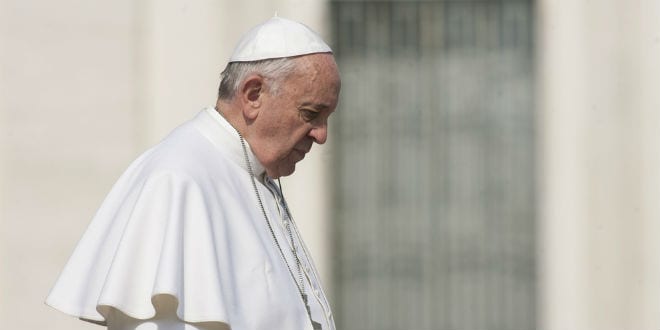In a move unprecedented since the Middle Ages, 62 clergy and lay scholars from around the world have issued a formal filial correction to Pope Francis accusing him of “propagating heresies” about “marriage, the moral life, and the reception of the sacraments.”
“Respectfully insisting” that the Pope condemns the heresies that he has directly and indirectly upheld, the letter suggests that the Catholic leader’s unorthodox views have “caused these heretical opinions to spread in the Catholic Church.” The Pope has yet to respond to the accusations.
According to the National Catholic Register, the 25-page Correctio filialis de haeresibus propagatis (A Filial Correction Concerning the Propagation of Heresies) was delivered to the pontiff at his Santa Marta residence on August 11. It accused him of propagating heresies, including allowing some divorced or remarried Catholics to receive communion.
Pope Francis is known for being more liberal than his predecessors, often embracing modernism, which is seen in Catholicism as the antithesis to definite truths, which are God-given, eternal, not to become “provisional and subject to revision.” In a trip to Lund, Sweden in 2016, the Pope came under Catholic condemnation when he visited the Lutheran Church of Sweden that is said to “accept contraception, abortion, homosexuality, and female clergy, all of which are strictly and unalterably forbidden in the Catholic Church.”
The same year, he made an official statement in Amoris laetitia (Pope Francis’ book, translated as The Joy of Love) calling for acceptance of non-traditional lifestyles and those who practice them, challenging the long-held Catholic condemnation of homosexuality. The Pope has even been compared to Protestant leader Martin Luther, to whom he has given “explicit and unprecedented praise” despite the fact that Luther’s attempts to reform the Church ended in a great schism.
The letter, dated July 16th, 2017, was signed by 62 Catholic leaders, including the superior general of the Society of St. Pius X Bishop Bernard Fellay, former president of the Vatican Bank Ettore Gotti Tedeschi, and German intellectual Martin Mosebach. This is the first filial correction addressed to a reigning Pontiff since Pope John XXII was reproved in 1333 for saying that those who died in grace do not see God face-to-face until the Last Judgment, where Catholic belief holds that those who die in the faith do indeed immediately meet with God.
The letter reads that it is with their “profound grief” but moved “by love for the Church and for the papacy, and by filial devotion toward yourself” that they must address “a correction to Your Holiness on account of the propagation of heresies affected by the apostolic exhortation Amoris laetitia and by other words, deeds and omissions of Your Holiness.”
Those who signed stress that they are not accusing the Pope of the formal sin of heresy, which is a heretic opinion expressed willfully and deliberately, knowing of its contradiction of some revealed truth. Rather, they accuse him of ‘material’ heresy, in which an opinion unknowingly contradicts the teachings of the Church, leading Catholics into false doctrines.
This is the sixth major initiative since September 2015 in which clergy and lay scholars have condemned the Pope’s liberal teachings and controversial passages in Amoris laetitia that contain “a number of statements that can be understood in a sense that is contrary to Catholic faith and morals.” These previous initiatives garnering hundreds of thousands of signatures from individuals and associations from around the world, none of which have garnered a Papal response.




